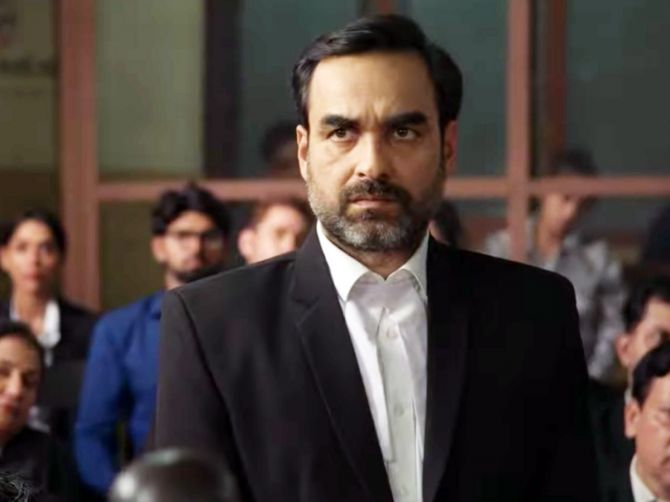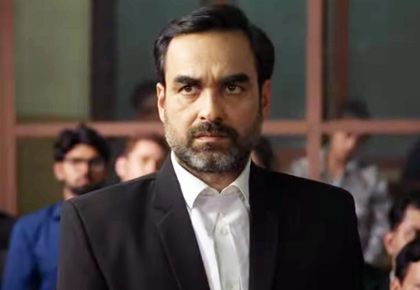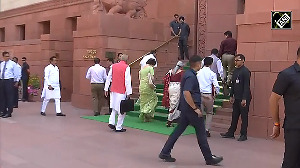Criminal Justice: Behind Closed Doors, is not a great show, but an efficient one, notes Sreehari Nair.

By the end of the second season of Criminal Justice, Kirti Kulhari subverts what can now be safely called the Taapsee Pannu Formula.
The Taapsee Pannu Formula entails staying low and subjugated for four-fifths of a movie's running time, before exploding using a three-page monologue that deifies your character, broadcasts a socially conscious message, and gets the audience on your side.
Criminal Justice: Behind Closed Doors also wants to get the audience on the side of its protagonist, Anuradha Chandra.
But Kulhari, who plays Anu, is too proud an artist to settle for easy applause.
We have, in the past, in movie after movie (Shaitaan, PINK, Indu Sarkar), seen this talented actress, being made to pay for her mournful countenance.
We have seen her boxed into roles, where she had to appear before us winded -- sobbing, wiping her nose with a hanky, appealing to our sympathy. Those roles, however, bespoke, not her limited range, but, the limited imagination of her writers and her directors.
And, as in the case of those weepy parts, here too, Kulhari fights the stereotype, not by screeching or emitting soliloquies, but by imbuing the stereotype with a fine sense of intelligence, so that fresh meanings get revealed to us.
Though she wears a sad Joan of Arc face throughout, moves with a sense of total disconnectedness, and utters barely 30 words, she designs for us a clear path into her character.
By the end, I could gauge how Anu Chandra came to be so messed up. I could intercept her complexes, read her silences.
The mess that Anu finds herself in provides the basis for Season 2: she has been accused of stabbing her husband, hot-shot lawyer, Bikram Chandra.
Jisshu Sengupta plays Bikram as a Boy Scout with something the matter with him.
He is righteous, helpful, has impeccable manners, and is always in command.
But there's also that slow toss of the head, and that suggestion of an internal calculator forever running inside him -- and they are significant breadcrumbs.
We can tell that the Boy Scout has a dark side.
And tell we can, that despite his gentle facade, he exerts considerable psychological hold over his wife, a wife who it seems cannot know the world unless her husband translates it for her.
As with Season 1, the setting and story movements are happy recreations of the UK version of Criminal Justice. And so, any discussion of, the plot, or, how the incidents play out, can be restricted to a few cursory sentences.
Between Bikram being stabbed in Episode 1 and the season concluding on a walloping note in Episode 8, enough hints are dropped, about how this is building up into a profitable enterprise for its makers.
Criminal Justice is not a great show, but an efficient one.
It is halfway between a commercial movie that shamelessly exploits sensational newspaper stories and a prophetic work of art that tells you what's coming.
This is a show that knows the present social climate and its seething undercurrents.
It knows that the subject of 'law, law-keepers and social justice warriors being irritated by nuance' is hot right now.
It knows that somewhere in the back of our minds, we citizens have begun to view Citizens Justice Fora as a fad whose day is done.
And so, as if to touch upon each of the aforementioned themes, Season 2, after the main story is established, forks out in many directions.
But it all ties back to Anuradha Chandra and her misery, a bit too strongly. And therein, lies the problem.
Directors Rohan Sippy and Arjun Mukherjee, and writer Apurva Asrani, have created a world that appears to have arranged itself entirely around the Bikram Chandra stabbing case.
Dinner table conversations are devoted to discussing the details of the case.
Newspapers are full of it.
Television channels, presumably, have no other story to report.
The case brings people together, and tears families apart.
It has the power to free some tongues, and make others tight-lipped.
This is a world, so utterly committed to the main plot-point of the show, that it stops having an axis it can call its own.
One hankers for some digression, some casual remark, some indication that things could turn independent of Anuradha Chandra.
But no, even the jailhouse of hardened criminals that our lady is sent to, seems like it was waiting for her to walk in and spice it up with her tale of bedroom betrayal.
The jail scenes derive their spirit from the jail scenes of Season 1, and they dramatise the same truth: How, in a seedy, filthy environment, an urbanite gets her hide hardened.
There's a formulaic approach about the whole show that may irk you (it did me; although I do admit to being invested in the goings-on), and you may find that the writing undercuts its ambitions far too often.
For instance, I found it odd that a show that wants to restore our 'sense of balance' wouldn't bestow the same blessing upon its characters. People get slotted too broadly as 'for' or 'against' Mrs Chandra -- and the biggest casualty of this segregation is Ashish Vidyarthi, the great Ashish Vidyarthi, who is presented as a table-tapping, scripture-spouting villain.
There's an interesting arc of a police couple (played by Kalyanee Mulay and Ajeet Singh Palawat) experiencing a personal catharsis of sorts, in the process of investigating the case, but the drama in that section feels inert. The arc gets furnished with brusque exchanges of dialogue, while what it needed were small wordless details.
If it feels like I am trying to re-imagine Criminal Justice as I am reviewing it, that's because the show is engaging even as it is self-limiting.
There were times when I -- like an old lady caught up in a TV Soap Opera -- yelled at my mobile screen in frustration, and rest assured there will be many like me.
The events are lopsided in an obvious sort of way in that the viewers can sense Anu Chandra's innocence ahead of the characters on the show, all with the exception of Pankaj Tripathi's Madhav Mishra and Anupriya Goenka's Nikhat Hussain.
Goenka, taking a deep breath before delivering her zingers, is wonderful, and gets, what is arguably the moment of the season, when she wipes lipstick off Anuradha Chandra's face before the court hearing.
'You should look like a victim,' says breathy Nikhat, and the practical-mindedness of that moment trumps the high sentimentality of many scenes.
Goenka, Pankaj Tripathi, and Kirti Kulhari have their day, but if you are a child of the '90s, there's pleasure to be gleaned, also, from watching Mita Vashisht, Deepti Naval and Ashish Vidyarthi do their little woo-woos.
Once the court proceedings get underway and Vidyarthi and Tripathi come face-to-face, the fight between the two lawyers escalates into a fight between two clearly diverse schools of acting.
Pankaj Tripathi as Madhav Mishra communicates almost completely using off the cuff gestures and lines.
Madhav, the desperate-for-a-case lawyer, has the air of a folk entertainer about him, and without spreading himself too thin, he mocks the overt formality of our bureaucratic setups.
The character is a minor revolution.
After the stentorian Ashish Vidyarthi presents his opening remarks, bursting with righteousness and cultural pride, and when Madhav Mishra points to the chinks in the remarks, his manner isn't vain, his tone is mumbling, and one does not hear the rim shots one is accustomed to hearing in sequences where a classic conservative is roasted.
When Madhav is himself left lurching in the middle of an argument, he absorbs the blow, not heroically, but like a sincere, mediocre fellow who has just had his plans thwarted.
I expect that all this will be detailed someday in a listicle, or dissertation, titled The changing face of the Bollywood Lawyer.
Lovable as he is here, the role, as I see it, represents one of the many recent attempts by Pankaj Tripathi to endear himself to the liberal audience.
Madhav Mishra is so decent, he may even be sexless: And he gets his claps that way. And even as he pursues such harmless characters, I hope Tripathi doesn't lose touch with that side of him that we saw in Gurgaon, in Gangs of Wasseypur, in Newton -- the side of him that respects the charms of the Indian Swindler, the musicality of the Indian Lout.
The two seasons of Criminal Justice taken together, it's not Pankaj Tripathi, however, who emerges as the standout performer (though you may be swayed into thinking so).
In my view, it's Pankaj Saraswat, as top cop Raghu Salian, who gives the Web series its stability through its numerous flashes and sputterings.
This season has a passing sequence, where Saraswat, supervising a crime scene, makes a sudden detour, and takes the oxygen mask off a victim's face to record his last words, before calmly sliding the mask back. Through that one clinical action of his, he brings us up close with the resourcefulness of Salian, while at the same time, adds incredible grace notes to his official designation.
This is hardly a showy part, but Saraswat ensures that Raghu Salian gets formed in our heads as the consummate professional, who, for all his competence, wouldn't stop till he does right by everyone.
It' a great example of a character built sequence by sequence, quip by quip, sigh by sigh, and although he hardly stretches himself, Pankaj Saraswat is doubtless the glowing sun in a show that waxes and wanes.













 © 2025
© 2025